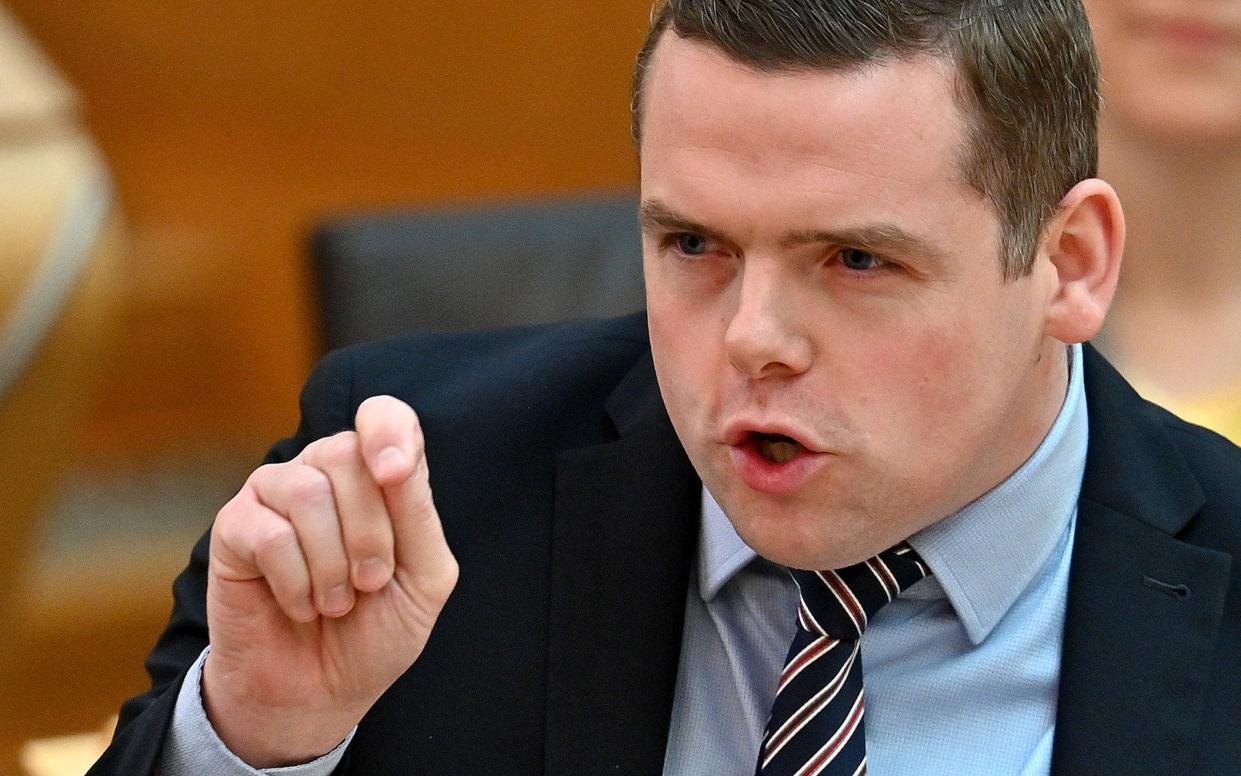SNP’s Covid ‘failures’ must not delay lockdown easing, says Scottish Tory leader

- Oops!Something went wrong.Please try again later.
- Oops!Something went wrong.Please try again later.
The SNP's "critical failures" in handling the record surge in Covid cases cannot delay the move to the lowest level of lockdown this month, Douglas Ross said after Scotland was confirmed as Europe's virus hotspot.
Mr Ross, the Scottish Tory leader, said it would be "completely unforgivable" for Nicola Sturgeon to again postpone her timetable to move to Level 0 of her five-tier system of restrictions on July 19.
He blamed SNP ministers "taking their eye off the ball" after the World Health Organisation's disclosure that Scotland was home to six of the 10 worst Covid hotspots in Europe last week.
But he argued that individuals and businesses should not be punished for the SNP's "shameful" record by restrictions lasting even longer, saying "pressing the pause button" was unnecessary.
His intervention came as a Tory analysis of official figures found Scotland's under-pressure contact tracing system was working at its slowest-ever pace, with just 29 per cent of positive cases contacted within 24 hours in the week ending June 27.
Ms Sturgeon last week said the system was "working well", but contact tracing teams have been ordered to prioritise "high risk" cases to reduce the backlog and are relying on alerting more people by text message rather than calls.
Updated WHO figures on Monday disclosed that Scotland had five of Europe's 10 worst Covid hotspots, with Tayside topping the list with 1,146 cases per 100,000 people.
Scotland's current case rate is 405.8 per 100,000 people – the highest figure since comparable records began last summer, when mass testing was introduced across the country. This is around 82 per cent higher than England's rate of 223.2 cases per 100,000 people and around four times Wales's figure of 101.2.
A further 2,372 cases were recorded on Monday, a drop from the record high of 4,234 last Thursday. However, the proportion of tests being returned positive increased to 12.6 per cent.
The number of Scots in hospital with the virus continued to rise, increasing by 22 to 338, while the total in intensive case rose by five to 30. Although no further deaths were reported in the previous 24 hours, registration offices are shut at weekends.
Humza Yousaf, the Scottish health secretary, confirmed at the weekend that the number of cases and hospitalisations would be considered in the next review of restrictions.
But Mr Ross said: "The SNP's critical failures in guaranteeing they are on top of controlling Covid in Scotland have been ruthlessly exposed.
"Scotland is now home to six of Europe's top 10 Covid hotspots and the Test and Protect system is completely overwhelmed. That is a shameful record and one which clearly shows SNP ministers have well and truly taken their eye off the ball in fighting the virus.
"It would be completely unforgivable if the SNP's failure to get on top of rising cases, their failure to support an effective Test and Protect system and their failures in getting vaccines in people's arms fast enough meant further devastating delays for individuals and businesses."
The Tory analysis also showed that fewer than a fifth of Test and Protect cases were closed in the week ending June 27, meaning it was taking longer to trace the close contacts of positive cases. The average number of contacts made was three – the lowest figure ever recorded despite the easing of lockdown restrictions.
A Scottish government spokesman said the system was still meeting the WHO target of closing 80 per cent of contacts within 72 hours.
He said: "As the First Minister has set out, we will have to manage living with Covid-19 for some time to come, even when we are able to move beyond Level 0. While we hope we are in the process of emerging from the pandemic, case rates at the moment underline the fact that this virus is still with us and we will consider all the evidence when the review the easing of restrictions."

